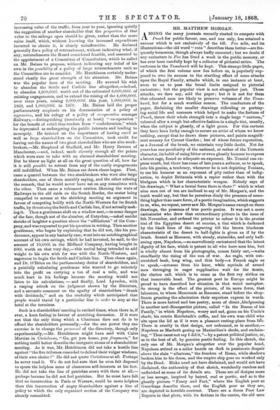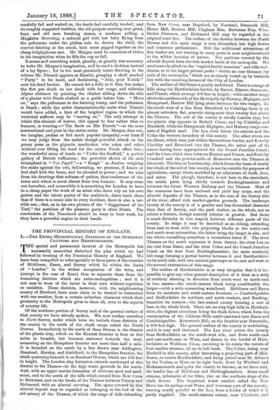MR. MATTHEW MORGAN.
AMONG the many journals recently started to compete with Punch for public favour, one, and one only, has attained a success which is not exclusively of the till. Fun sells, and its illustrations—the old word " cuts " describes them better—are fre- quently humorous, though always badly executed ; but we doubt if any caricature in Fun has lived a week in the public memory, or has ever been carefully kept by a collector of pictorial satire. The cartoons in the Tomahawk will be kept. This strange little paper, of which the first volume now lies before us, is popularly sup- posed to owe its success to the startling effect of some attacks upon the Royal Family, attacks which, in one instance at least, seem to us to pass the broad limits assigned to pictorial caricature ; but the popular view is not altogether just. Those attacks, we dare say, sold the paper ; but it is not for them that educated men are likely to preserve volumes of the Toma- hawk, but for a much worthier reason. The conductors of the paper, disdaining the smaller drawings ridiculing or portray- ing social life and manners which helped to make the fortune of Punch, throw their whole strength into a single large " cartoon," coloured after a rough but effective fashion in a single tint, usually, when the subject is ghastly, of a light green. For this cartoon they have been lucky enough to secure an artist of whom we know nothing, except that be draws these pictures, and paints magnifi- cent scenery for Covent Garden ; but of whose future reputation, as a Juvenal of the brush, we entertain very little doubt. Not for years has one peculiarity of the national, or rather of the Teutonic character, its habit of using bitter or even ghastly humour to express a latent rage, found so adequate an exponent. Mr. Tenniel can ex- press wrath, but there has come of late years a softness, so to speak, into his genius, a tendency, whenever he is not depicting Fenians, to use his humour as an exponent of pity rather than of indig- nation, to depict Britannia with a rapier rather than with the bludgeon which is her characteristic weapon. Nobody says of his drawings, " What a brutal force there is there !" which is what nine men out of ten are inclined to say of Mr. Morgan's, and the tenth would say, but that he perceives dimly the presence of some- thing higher than mere force, of a poetic imagination, which suggests to us, who, we repeat, never saw Mr. Morgan's name except on these drawings, the presence of true poetic genius. It was not a mere caricaturist who drew that extraordinary picture in the issue of 9th November, and ordered the printer to colour it in the precise tint of the Egyptian desert at sunrise, a tint which is darkened by the black lines of the engraving till the brown blackness characteristic of the desert in half-lights is given as if by the brush. Seated as Memnon, with steady, statuelike, and only half- seeing eyes, Napoleon,—so marvellously caricatured that the latent dignity of his face, which is patent to all who have seen him, but is wholly absent from his photographs, comes fairly out,—waits steadfastly the rising of the sun of war. An eagle, with out- stretched beak, long wing, and thin body—a French eagle so to speak,—screams from his knee, while myriads of armed men thronging in eager supplication wait for the hinge, the clarion call, which is to come as the first ray strikes on that immovable head. The greatest poet in Europe might be proud to have described her situation in that weird metaphor. So strong is the effect of the picture, of its mere force, that labourers, to whom Memnonis as Rameses, stand before the shop- fronts grunting the admiration their superiors express in words. There is more hatred and less poetry, more of direct ,bludgeoning in another anti-Bonapartist picture, called " In the Bosom of his Family," in which Napoleon, weary and sad, gazes on his Uncle's shade, his cousin Reichstadt's coffin, and his own wan child who sits upon the lid as if it were a pleasant resting-place from life. There is cruelty in that design, not redeemed, as in another,— Napoleon as Macbeth gazing on Maximilian's shade, and exclaim- ing, "Thou canst not say I did it,"—by a patent political justice, or, as in the best of all, by genuine poetic feeling. In this sketch, the only one of Mr. Morgan's altogether over the popular head, Napoleon attired as a sailor kneels on deck in passionate despair above the slain " albatross," the freedom of Rome, while shadows beckon him to his doom, and the empire ship goes on worked only by the Dead. Blake need not have disdained, and would not have disdained, the authorship of that sketch, wretchedly careless and unfinished as some of its details are. These are all designs more or less savage, inspired by hatred, real or poetic, and so is the ghastly picture " Fancy and Fact," where the English poor as Guardians describe them, and the English poor as they are, are depicted in horrible contrast. There are a dozen Poor Law Reports in that plate, with its fictions in the centre, the old men
carefully fed and waited on, the death-bed carefully tended ; and its roughly suggested realities, the old paupers mowing over gruel, boys and old men breaking stones, a madman yelling, a Magdalen drowning, a seduced girl with her baby flying from the policeman under the pitiless rain to drown the child, the convict fainting at the crank, both sexes pigged together on the cheap lodginghouse mat. Mr. Morgan must be conscious of riches in his imagination when he fills the cup so full.
It seems as if something weird, ghostly, or ghastly was necessary to wake Mr. Morgan's imagination, as if he used a skeleton instead of a lay figure ; for in the most genuinely comic drawing in the volume Mr. Disraeli appears as Hamlet, grasping a skull marked " Party" in his hand, and declaiming, " Alas, poor Yorick !" over his dead faction. He cannot bit a folly as it flies, but makes the flirt put death on her cheek with her rouge, and ridicules Alpine clubmen by painting the climber sliding down the side of a glacier with Death clothed as a guide before him. " Move on," says the policeman to the fainting tramp, and the policeman is Death ; while the artist characteristically omits what Tenniel would have added, a hint of the brighter region to which the wretched sufferer may be "moving on." The only attempt in which this element of horror, this appeal to fear rather than to humour, is wanting—" The Snob on His Travels "—is the most conventional and poor in the entire series. Mr. Morgan does not, we imagine, profess or feel much popular sympathy,—at least if we may judge from the unfair though powerful attack on the penny press as the gigantic muckraker, who rakes and rakes without ever lifting his head for the crown Truth offers him ; the wonderful array of heads in " Under the Scaffold," a perfect gallery of British ruffianism ; the powerful sketch of the mob triumphant in " Vox Poputi"—a " Rough" as Justice weighing the snake against the owl, deliberating, we presume, if knave or fool shall kick the beam, and be elevated to power ; and we miss from his drawings that softness of pathos, that tenderness of the inner soul which is never absent from true humour. It may come out hereafter, and meanwhile it is something for London to have in a cheap paper the work of an artist who dares rely on his own genius and the latent poetry of the multitude, dares teach them that if there is a comic side to every incident, there is also a ter- rible one ; that, as in his own picture of the " Juggernaut of the Turf," the postilion of the pleasure party is often Death. The conductors of the Tomahawk should be wary in their work, for they have a powerful engine in their hands.































 Previous page
Previous page